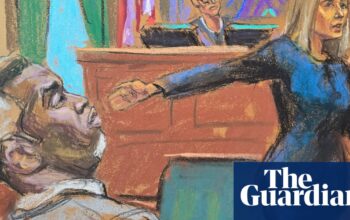Hey y’all: listen up to the chartbusting, pop-pickin’, time-addled DJ: “Yes indeed, Band Aid’s Do They Know It’s Christmas is back with a bang, a twist and a mix! This time our ultimate white saviour anthem is ready for for a generation weaned on AI remixes: a menage a trois of the original 1984 version mixed in with the 2004 and 2014 versions. Britain is about to feel good and “Africa” is finally about to get fed! WICK-ED! Joining us to discuss this is my mate, a fountain of all that is good in the world, the great Sir Bob Geldof …”
We don’t know exactly what the forthcoming, 40th-anniversary version of Do They Know It’s Christmas?, featuring a mashup of previous versions into a new “ultimate mix”, will sound like. But I do fear the worst.
So does Ed Sheeran, who is currently the 10th most-listened-to artist on Spotify and one of the stars of the 2014 version of Band Aid. Following the lead of British-Ghanaian Afrobeats star Fuse ODG, Sheeran has taken a principled stand against his unauthorised inclusion in the re-release. “My approval wasn’t sought on this new Band Aid 40 release, and had I had the choice I would have respectfully declined the use of my vocals. A decade on and my understanding of the narrative associated with this has changed.” Very well said.
In a video released online, Fuse ODG painstakingly detailed the effect of Band Aid: “While they may generate sympathy and donations, they perpetuate damaging stereotypes that stifle Africa’s economic growth, tourism and investment, ultimately costing the continent trillions and destroying its dignity, pride and identity. By showcasing dehumanising imagery, these initiatives fuel pity rather than partnership, discouraging meaningful engagement.”
In a just world, Fuse ODG would be showered with honours for his work on uplifting the image of Africa and helping to bring African music into popular culture. In the process, he helped to do the opposite of absolutely everything that he suggested Band Aid does. As I type these words, I am sitting by a pool in a hotel in Lagos – by dint of population, the Blackest place on Earth. To my left is a group of American business people and to my right a group of young British and Nigerian tourists. A table full of Chinese and Nigerian business people is not far from us. Though chronic poverty remains a serious issue, the signs of hard development and investment are stark.

This is no easy achievement. My previous career in financial services left me with a vivid and vicious understanding of how difficult it was to raise investment for African ventures – no matter how polished your PowerPoint deck was, no matter how great or persuasive a presenter you were, how enticing the potential profits looked. It is unbelievably hard to compete with shocking imagery, children with flies on their faces, charity videos broadcast on TV every 15 minutes. Those adverts became the dominant perspective of the motherland. The power of Band Aid’s celebrity helped ensure that generations of Brits inherited this perspective of a hopeless Africa. Thankfully, initiatives such as Pledge for Change are helping to right that wrong.
But Band Aid had an even darker impact. However well-intentioned, it turned out to be a western soft power coup and an assault on Africa. It arrived on the centenary of the 1884 Berlin Conference, at which European imperial powers grappled for control of Africa. So in 1984, at the very moment Britain and other western states should have been reflecting on the impact of that scramble and the subsequent explosion of colonisation, the British entertainment establishment released a charity single “for Africa”.
This completely overshadowed any discussion of Britain’s and other western nations’ complicity in the very plight they were supposedly trying to help relieve. This became something of a tradition: the 2004 version of Band Aid eclipsed the 120th anniversary of the Berlin Conference, the 2014 version did the same for the 130th. Guess what? We’re now at the 140th anniversary of the Berlin Conference and – SURPRISE – we’re speaking about Band Aid and not the colonialism that created an opening for it to exist.
The BBC plans to “mark” the 40th anniversary of Band Aid with a documentary “complete with footage that has never been broadcast”. And yet it was pretty mute on the 140th anniversary of the Berlin Conference (as it was the other landmark anniversaries of the conference – which helps explain why so many have never heard of it). Instead of a serious conversation about reparations or a Marshall plan for Africa, we get super dehumanising adverts seeking 50p a month and a well-timed national singalong that we trot out at the exact moment we should be speaking about economic justice and repair.
Fuse ODG, Ed Sheeran, and other critics: they’re on to something. If people want to take a view of how to make this a fairer world, I applaud that. But we need long-term solutions. Do They Know It’s Christmas, however well meant, is just a charity singalong. These days, that doesn’t cut it.
-
Nels Abbey is an author, broadcaster and the founder of Uppity: the Intellectual Playground
Do you have an opinion on the issues raised in this article? If you would like to submit a response of up to 300 words by email to be considered for publication in our letters section, please click here.
Source: theguardian.com


